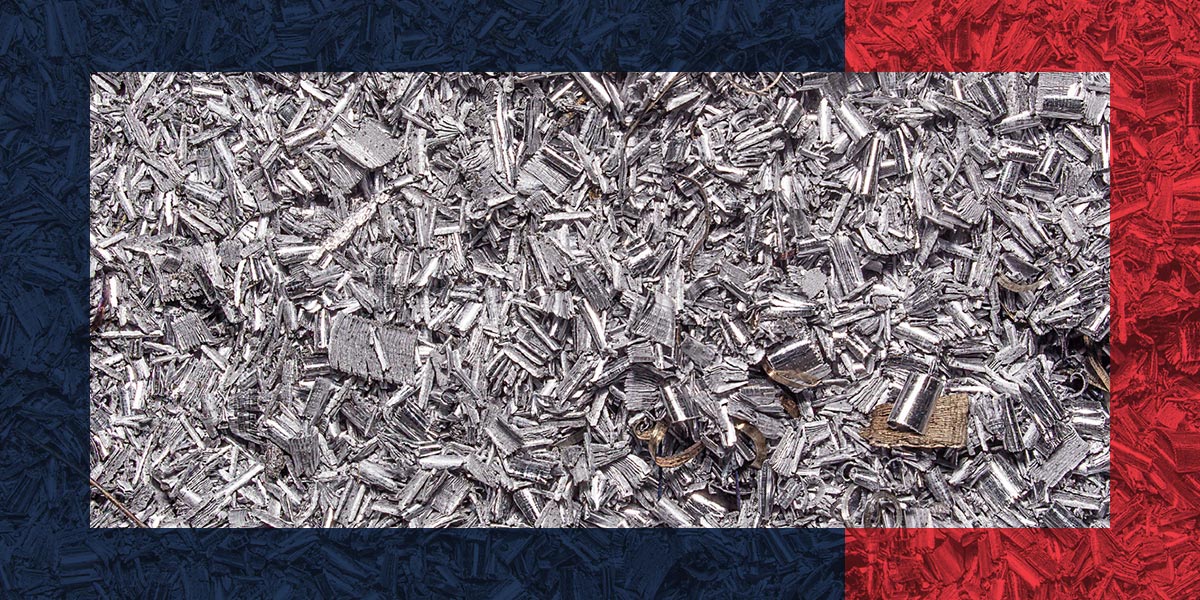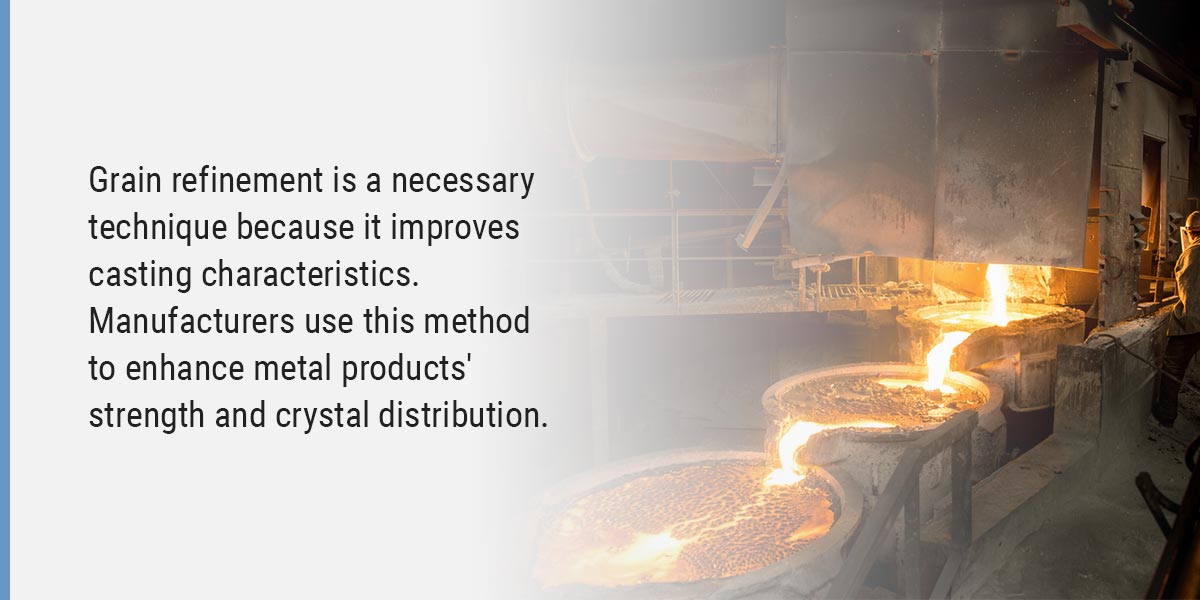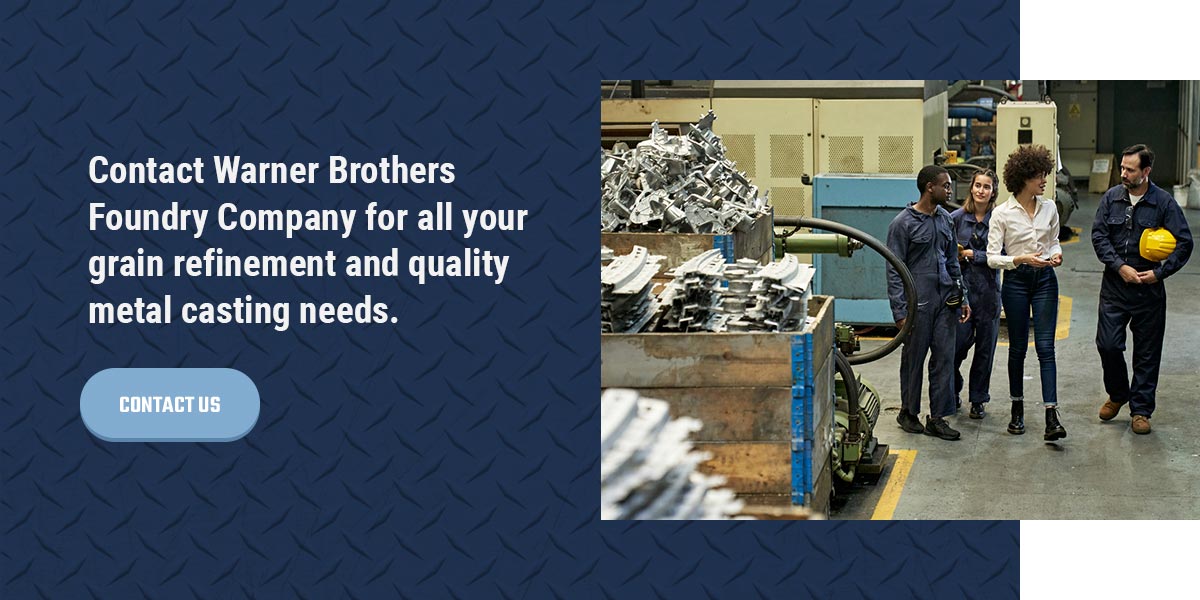Metal casting is an essential production process for metal materials. This five-step process creates a wide range of products, from jewelry to industrial machines and allows for high-quality and durable materials.
Grain refinement is a critical aspect of metal casting. As grain size shrinks, metal products have enhanced mechanical properties, such as hardness and strength. It also improves structural soundness and enhances cosmetic appearance. Grain refinement of non-ferrous alloys reduces grain size for this specific alloy type.
Read on to learn more about grain refinement in metal casting.
What Is Grain Refinement?
Grain refinement reduces grain size during the solidification phase of metal casting. The process strengthens cast alloys and improves their mechanical properties, including strength, hardness and elasticity. Refinement can also enhance surface finishes and improves tear resistance. Grain refinement is a necessary step for many casting procedures.
Grain refinement of non-ferrous alloys — metal mixtures without significant amounts of iron content, such as copper, aluminum and zinc — focuses on these types of metals and increases their strength, resistance to tears and attractiveness. For example, aluminum grain refining can enhance traits like malleability. The method ensures that grains stay close together and in a uniform structure during cooling.
Grain refinement is particularly beneficial because non-ferrous metal castings often have slower cooling rates and a variety of thicknesses. In particular, grain refinement is crucial for applications like:
- Automotive castings: Many automotive metal castings, such as suspension parts, cylinder heads and brake components, require the enhanced mechanical properties and strength that grain refinement provides.
- Aerospace and military castings: Many aerospace and military metal products require mechanical properties like strength, malleability and ductility. Grain refinement can enhance castings to meet these needs.
- Sand castings: Lastly, sand castings use sand as the mold material. These projects often have long solidification times, leading to larger grain growth. By using grain refinement, you can keep the grains at a smaller size.
Why Is Grain Refinement Done?
Manufacturers use grain refinement to enhance metals during the casting process. In metal casting, manufacturers make a mold and transfer molten metal into it. After the liquid cools, it forms the desired shape. As castings solidify, grains form and merge together to build the material. If there is too much space between grains, they can become porous and let in other materials, such as hydrogen. High levels of porosity might lead to cracks in the casting.
Grain refinement prevents these effects and ensures the casting’s stability. It shrinks the grain sizes of metals as they solidify, creating a tighter and more uniform microstructure. As a result, there is less space between grains and a lower chance of hydrogen entering the material. These smaller grains have improved castability and lower density, which are ideal for metal-casted products.
Overall, grain refinement is a necessary technique because it improves casting characteristics. Manufacturers use this method to enhance metal products’ strength and crystal distribution.
What Is the Grain Refining Process?
The grain refining process occurs during the solidification phase of metal casting.
You can use three different approaches for grain refinement. The best technique to use depends on the material type. These processes create a high number of nuclei that aid with the ideal microstructure:
1. Thermal Refinement
During this process, you control the cooling rate of the alloy. A rapid cooling rate aids in the growth of finer grains. It limits the development of larger grains, instead creating the desired microstructure for grain refinement.
2. Mechanical Refinement
Another option for grain refinement is a mechanical method. This process involves agitating the alloy during the solidification phase of casting. You can use electromagnetic, mechanical or other stirrers to move the alloy in its semi-solid state. This method helps the grains distribute more evenly, allowing for smaller grain sizes.
3. Chemical Refinement
Chemical refinement involves the use of master alloys, which are a mixture of metals and elements. Alloys can be an appealing alternative to pure metals because pure metals are softer and more prone to corrosion damage.
The master alloys promote nucleation, which is the formation of crystals in a solution. Before casting, you add grain refining additives — a combination of metals mixed with the alloys — to the master alloys. These additives will facilitate the refinement process later.
Depending on your material type, you can use different metals and alloys in refinement. Manufacturers commonly use a combination of titanium and boron to help with grain refinement, as these alloys respond positively to grain size refiners and reduce grain size.
How to Check Your Quality
Once you have completed your chosen method, you can use various effectiveness tests to check the quality of your casting and the effectiveness of your grain refinement.
One popular way to assess the grain refinement process is thermal analysis. During thermal analysis, you collect data on the temperature of a non-ferrous alloy as it solidifies. Then, you compare your collected data to a grain size index scale. You can typically deem your grain refinement successful when your score matches the high end of the scale.
Advantages of Grain Refinement
Grain size reduction in metal casting has become an essential component of non-ferrous processes. It provides many benefits for non-ferrous castings, including:
- Increased strength: Grain refinement enhances the strength of metal alloys during casting. The resulting products are more resistant to tears in material, retaining their shape after harsh impacts. Manufacturers can create durable products that will last longer, even under adverse conditions.
- Better reaction to finishings: Reduced grain sizes and uniform structures make it easier to add polishes or perform other finalizing steps after casting.
- Uniform crystal distribution: Various defects can occur during casting, including grain segregation. Grain segregation results from grains combining unevenly, which can create undesired shapes that make the casting less attractive. Grain refinement spreads grains into an even distribution, creating an enhanced appearance for castings. The uniform distribution also improves the casting’s response to heat, allowing it to endure high temperatures without compromising its condition.
Contact Warner Brothers Foundry Company
Contact Warner Brothers Foundry Company for all your grain refinement and quality metal casting needs. We are a full-service bronze, brass and aluminum casting foundry that helps a wide range of industries.
We have provided high-quality services to customers since 1955 and our dedicated team can help you find the best alloy for your needs. With our wide range of services, you’re sure to find the best solution for your project. We also test your completed casting to ensure it meets your requirements.
To get started with Warner Brothers Foundry Company, contact us today.




